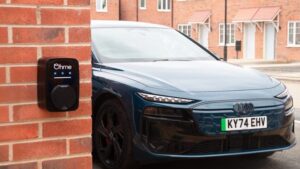The House of Lords voted to support an amendment to the Planning and Infrastructure Bill that would make charger accessibility standards legally binding. The Opposition-led amendment passed after the Government rejected the proposed changes during debate.
The amendment would allow the Government to enforce the PAS 1899 standard as law. Right now, accessibility standards for public chargers are just guidelines that operators can choose to follow or ignore.
Less than 3% of existing public chargers meet the PAS 1899 standard.
Half of all drivers report accessibility problems when using public chargers, according to research by EVA England. The issues affect drivers with and without disabilities.
Common problems include heavy cables that are difficult to handle, parking spaces that are too narrow, and screens positioned too high or low to reach comfortably.
What PAS 1899 covers
The guidelines set standards for screen height, cable mount positioning, parking bay design, and user interfaces. They also require features that make connecting cables easier.
Lord Borwick introduced the amendment, which passed by 228 votes to 113.
“Disabled people will see no end to the struggle of charging their cars safely and reliably” without government intervention, Lord Borwick warned during the debate.
He described the amendment as being about “fairness and foresight: making sure that as we move to electric driving, no one is left behind.”
Baroness Tanni Grey-Thompson, the Paralympic athlete and Crossbench Peer, had previously campaigned for PAS 1899 to become legally binding. She said she was “delighted” the amendment was introduced.
The accessibility issues have real-world consequences for drivers.
Grey-Thompson explained how poor charger design prevented her from switching to an EV: “When I tried several times to move to an electric car, it proved impossible. There wasn’t an accessible charging station within at least 30 miles of my house. I was told perhaps I should take someone with me wherever I went to charge it for me.”
Industry response
Vicky Edmonds, CEO of EVA England, called the vote’s outcome significant for drivers with disabilities.
“This is huge for drivers with disabilities. We need to ensure that accessible charging is not left to chance, but is thought about from the very beginning when industry and local authorities are planning, designing and rolling out chargepoints. And this amendment does that.”
The amendment still needs to pass additional legislative stages before becoming law.





